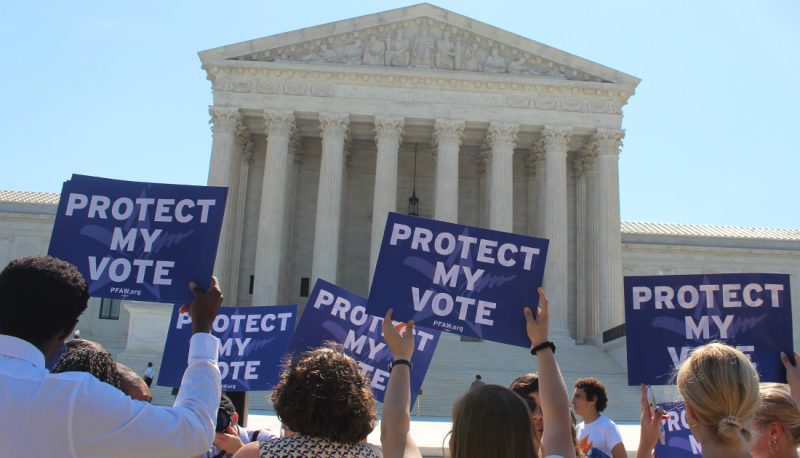Trump Justices Neil Gorsuch, Brett Kavanaugh, and Amy Coney Barrett cast deciding votes in a 5-4 “shadow docket” ruling that allows Alabama to use a redistricting map it designed. This was despite a lower court ruled that it discriminates against Black voters. The February 2022 ruling was in Merrill v Milligan.
Alabama’s Discriminatory Redistricting Map
After the 2020 census, Alabama approved a new map that redrew its seven congressional districts. Black voters challenged the map as discriminatory. They pointed out that even though Black voters have increased to 27% of the state’s voters, they make up a majority in only one of the districts. A special three-judge court, including two Trump district judges, heard the case.
The court agreed that the map is discriminatory because it gives Black voters “less opportunity than other Alabamians to elect candidates of their choice to Congress.” It ordered the state immediately to create new maps that would include a second majority Black district. Instead, Alabama asked the Supreme Court to stay the court order and reconsider the case.
Supreme Court’s 5-4 Ruling
In yet another “shadow docket” ruling with no explanation, the three Trump justices and Justices Clarence Thomas and Samuel Alito granted the state’s request. By a 5-4 vote, the Court stopped the lower court order and agreed to review the decision on the merits. That review will likely last until after the 2022 elections. This forces use of the state’s discriminatory map in 2022.
Although the majority did not issue any opinion, Justice Kavanaugh wrote a concurring opinion joined by Justice Alito. Kavanaugh claimed that the stay of the lower court order was proper under the so-called “Purcell principle.” Under that view, he explained, lower courts “ordinarily should not enjoin a state’s election law” too “close to an election.” According to Kavanaugh, the “late-breaking injunction” violated that principle. If the Court eventually affirms the lower court’s analysis, he wrote, the injunction would apply to “congressional elections that occur after 2022.
Chief Justice Roberts’ Dissent
Chief Justice John Roberts dissented from the majority’s order to stay the injunction and allow the state’s map to be used in 2022. He explained that the court had “properly applied existing law in an extensive opinion with no apparent errors for our correction.”
He did agree with the decision to review the case on the merits, however. He maintained that current case law on “vote dilution” claims like those made in this case has “engendered considerable disagreement and uncertainty” and that the Court should “resolve” the “uncertainties” in reviewing the case. In other words, Roberts disagreed about staying the lower court order, but may well agree to revisit and weaken vote dilution rules in the future.
Justice Kagan’s Dissent
Justice Elena Kagan wrote a strong dissent, joined by Justices Stephen Breyer and Sonia Sotomayor. She vigorously disagreed with the claim that the lower court order violated the Purcell principle. She pointed out that the district court rejected that argument because we are not “just weeks before an election” as in that case.
Instead, Kagan continued, the general election is “nine months away,” the first day of absentee voting for the primaries comes “more than two months after” the lower court’s order, and the state had enacted its initial plan in “less than a week.” She noted that the Supreme Court has “previously denied stays of districting orders issued at similar times.” Alabama is “not entitled to keep violating Black Alabamians voting rights,” she wrote, “just because the court’s order came down in the first month of an election year.”
Justice Kagan carefully explained how the district court had correctly “applied established legal principles to an extensive evidentiary record.” That record resulted from “seven days of testimony” and “more than 1.000 pages of briefing.” The court concluded that Alabama’s redistricting plan “unlawfully diluted” the votes of the state’s Black population under the Voting Rights Act by failing to create a second majority-Black district. Accepting Alabama’s view, Kagan maintained, “would rewrite decades of this Court’s precedent” about the Act and minority voting rights.
The state showed no good reason to do so on the merits, she continued, and certainly not to stay the lower court injunction without explanation. The decision is “one more in a disconcertingly long line of cases,” Kagan concluded, where the Court “uses its shadow docket to signal or make changes in the law, without anything approaching full briefing or argument.” Even more importantly, she wrote, the ruling harms “Black Alabamians” who saw “their electoral power diminished – in violation of a law that this Court once knew to buttress all of American democracy.”
Dangers Of The Court’s Ruling
Experts have already recognized the harm and dangers of the Court’s ruling. Election law specialist Rick Hasen has explained that it is “ominous” in several ways. In addition to its effects in 2022, it could result in “radical reworking” of voting rights law as applied to redistricting cases that would seriously harm redistricting and decrease “minority representation” in Congress and state legislatures. In addition, he wrote, the majority’s use of the “Purcell principle on steroids” could make it difficult or impossible to successfully challenge discriminatory redistricting plans.
When the Court considers the Alabama case on the merits, it could be one of the earliest decisions in which Biden’s forthcoming nominee to the Court participates. Her replacement of Justice Breyer unfortunately will not change the views of the right-wing Court majority. But the addition of a Black woman justice can only sharpen and hopefully improve the Court’s focus on the fundamental rights at stake in this voting case.

